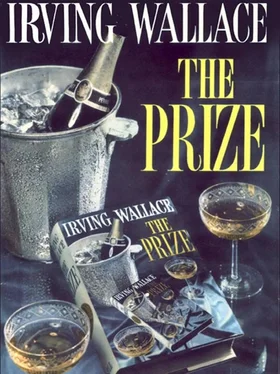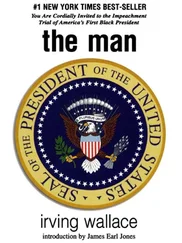Any moment, she knew, and so, hastily, she implored her lethargic body to anticipate him. Once more, she closed her eyes tightly, and made her bound bosom heave, and she moaned and begged him not to torture her and begged him to be done with it or else she would die-wondering all through this if her performance was too theatrical, if he could sort the synthetic from the real-and at once, she knew that she was succeeding. Seeing that the climax of the play was upon them, she froze to his frame, then subsided into tiny helpless cries of pleasure, and clutched his elusive transported being as best she could, and when she was positive-for the expected thunder was merely a squeak-she acted a final heaving spasm of release, timed to match his own, but towering above his own to make her pride small and his pride large, and, mon Dieu , it was done.
He fell beside her, balancing precariously on the sofa to keep from dropping to the floor, and she placed an arm over her eyes-she had seen the pose once in a French film and had always thought it to mean the woman had been satisfied-and they both rested in silence.
At last, she removed her arm from her eyes. Her neck was stiff, and hurt from reclining without a pillow. She realized that he was looking at her, and that his features reflected growing shame-similar to those of a rough farm boy who has just learned that the female he had taken by force was none other than the Queen-and the enormity of his desecration was beginning to overwhelm him.
Denise moved at once to prevent this reaction. She did not want his protestations of guilt, his apologies, his humbleness, and, in the end, his frightened avoidance of her. He must know that he had not pillaged a holy temple.
‘ Merci , Oscar,’ she said softly. ‘ C’est beau . I have never been loved better.’
He blushed-that he could blush even now!-and sighed.
‘It is true,’ she went on. ‘You satisfied me.’
The Adam’s apple skittered up and down, like a simian in a banana tree. ‘I am so glad,’ he was saying. ‘I was not sure.’
‘I am fulfilled, Oscar, and I thank you with all my heart.’ She glanced at her watch and sat up with dismay. ‘So late. It is difficult to leave you, Oscar-I do not know what I shall do-but I must hurry back to the hotel, before my husband returns.’ Her slip was still bunched at her waist, and quickly and chastely she drew it across her knees.
He had watched her. ‘You are beautiful, Denise.’
‘Do not be naughty-or you will tempt me again.’
He pushed himself to a sitting position. ‘If only it were possible-’
She brushed his cheek with her lips. ‘It will be possible,’ she said, and then added, ‘You may as well know, I must see you every day I am here.’
‘I pray for that. When may I see you again?’
‘Tomorrow-tomorrow night in my suite.’
‘But your husband-?’
‘He is spending the evening in Uppsala, addressing the faculty. He will not return until long after midnight. You must come to me early- à huit heures du soir -I want to enjoy you in leisure. It will be heaven, I promise you.’ It will also, she thought, be the decisive turning-point of my marriage.
When she had finished in the bathroom, had dressed, combed, made up her face, she returned to find that the blinds had been opened and that Lindblom, clothed, was regarding her possessively.
She was gratified. She had performed well.
‘I was thinking how lucky I am,’ he said, ‘to have found-something besides algae-’
She went jauntily to him, and gave him a hasty off-to-work, married kiss. ‘It is not you who are lucky, but I. To think that I believed only France was the land of love. How provincial and insular we French become. But I am learning, and you are teaching me. Au revoir , dear Oscar, and thank you. Do not be late tomorrow night. Every moment with you is important to my life.’
Although it was already two o’clock in the afternoon of December seventh, the double bed in the Nobel suite on the fourth floor of the Grand Hotel was still occupied by a laureate.
Except for several visits to the bathroom, John Garrett had not left his bed of pain all morning, or since. The major injury he had sustained in the Hammarlund garden was not corporeal but spiritual. His gut still ached from Farelli’s fist, and his right eye had swollen slightly, although he had not been hit in the eye but on the jaw. But these were minor hurts, and would pass away. What would not leave him was the laceration of his self-respect.
The memory of what had happened to him was an affliction which no salve or pill could remedy. From the moment of wakefulness, early this morning, he had been reminded, by throbbing belly and jaw of his humiliation, and morbidly he had relived the scene many times in the hours that were behind him.
Sometimes he thought that he had demeaned himself by his unusual behaviour. He had not struck, or been struck by, a fellow human being since he had come of age. He was an intellectual, a man of medicine, not an outdoor brawler. Fists settled nothing, except whose biceps were larger and who took more exercise. He had not meant to fight. It was just that the sight of Farelli, so self-assured at the party, had incited Garrett beyond control. And the drinks had been his final downfall. He was not a drinking man, and so that was wrong. If he had not had the drinks, he might not have swung at his rival. On the other hand, if he had not had the drinks and had swung at Farelli, he would have been sober enough to have won the fight. The righteous always won the fight, didn’t they? At any rate, he kept reminding himself, he had not meant to stoop so low, had only meant to put Farelli in his place with words, let him know that Garrett was no fool and had his number. He was sorry, too, that he had used the language he had used, and then, again, he was not sorry, for the charlatan deserved no better. But to have been knocked down, made to grovel at the criminal’s feet, that was what really rankled. And, almost as bad, to have had an outsider, Craig, witness this miserable subjugation.
What had followed, he kept remembering, had not been too bad. His eye had not yet begun to puff, and, reinforced by more drink, he had survived the formal dinner. When Saralee had put him to bed, he had told her everything-his version, of course-and she had sympathized, wifely moved and upset, and had spoken darkly of putting the police after that unruly Italian hooligan.
Now it was morning-no, afternoon-and he was still in his bed, too distressed and heartsick to leave it and commune with the hostile world outside.
The door buzzer sounded, and he heard Saralee call from the sitting-room, ‘That must be Dr. Öhman. I’ll get it.’
Garrett propped himself higher on the pillow, wondering why Öhman had come. Then, through the parted drapes, he saw that the visitor was not Öhman at all, but the white-coated room-service waiter who had called for the lunch tray.
When the waiter had gone, Saralee came to the foot of the bed.
‘Are you feeling any better, John?’
‘I’ll live.’
‘Dr. Öhman should be here soon. Do you want to get out of your pyjamas and dress?’
‘No, I’ll see him here.’
After Saralee had returned to addressing her postcards, Garrett left his obsessive reliving of last night’s horror, and tried to put his mind on Öhman. At eleven o’clock in the morning, Öhman had telephoned, and Saralee had taken the call. Öhman had sounded, she said afterwards, excited, bursting with some kind of news. He had inquired if Garrett would be free in the afternoon, because if he were free, there was something extremely important Öhman must tell him. Saralee had covered the mouthpiece and repeated this to her husband, and Garrett had waved his hand negatively, muttering that he wanted to see no one. But then he had said, ‘Ask him what it’s about.’ Saralee had asked what it was about, listened, and said to her husband, ‘It’s about Farelli.’ At once, Garrett had been curious, and eager to see an ally. ‘Tell him to come over at two.’ Now it was just past two, and Garrett was waiting and wondering. What he wondered the most about was whether Öhman had learned of the fight, and was coming to warn him of trouble. And again, obsessively, his mind relived the fight.
Читать дальше












